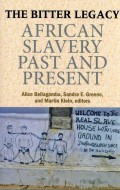
This collection of essays explores the ways that memories of African slavery and the slave trade persist into the present, as well as the effect those memories have in shaping political, social, economic, and religious behavior today. The articles take a range of approaches: several examine the stigma that slave origins engender; one pairs lamentations about slave raiders with songs that celebrate a community’s victory over a major predator; another looks at the impact of slavery through the lens of tales told by children. One author examines the techniques used by descendants of slave traders and slave owners to overcome their guilt, such as worshiping the spirits of those enslaved by their ancestors, while another shows how democratic politics has made it possible for descendants of slaves to liberate themselves from their inferior social status.
The authors use a variety of sources — interviews, proverbs, songs, religious art, newspaper articles, and children’s stories — to illuminate not only how people remember the past but also how they struggle to liberate themselves from it.
